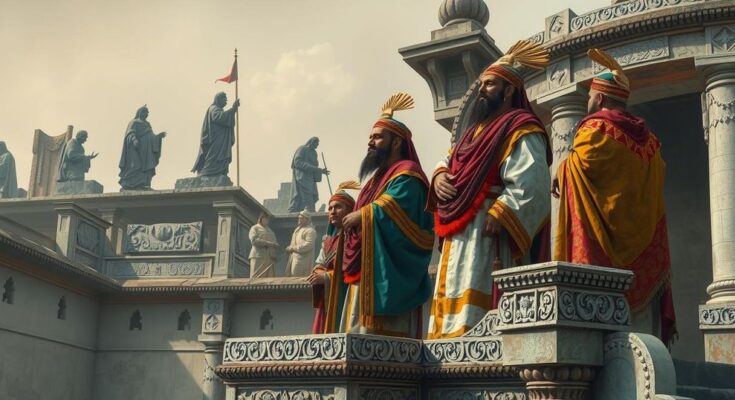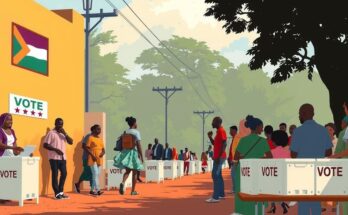The Royal Praise Choir of Cameroon has recently praised President Paul Biya, lauding his ‘wisdom’ while the country suffers from economic decline and social injustice. Critics argue that these traditional rulers have become political cheerleaders, prioritizing their benefits over community wellbeing. The situation raises concerns about the future leadership of Cameroon and the urgent need for genuine democratic change amidst a failing governance system.
In a surprising display, the Royal Praise Choir of Cameroon, also referred to as the National Council of Traditional Rulers, has recently lauded President Paul Biya’s alleged wisdom rather than addressing critical issues such as poverty, insecurity, and youth unemployment. Their synchronized praises laud Biya’s governance, even amid the country’s evident economic decline and resource mismanagement.
Critics question what complexities justify the praise, noting that Cameroon has faced severe economic challenges, high unemployment, and infrastructural failures, such as inconsistent access to water and electricity. The traditional rulers appear to prioritize their financial interests and ceremonial roles over genuine concern for the nation’s future, benefiting from monthly allowances and events hosted by Biya.
At 92 years old, Biya is portrayed as the sole leader capable of guiding Cameroon. This raises critical points given that over 60% of the population is youthful, unrepresented, and jobless. Furthermore, the economy has been stagnant, dominated by corruption and mismanagement, while the ongoing Anglophone crisis has led to significant loss of life without a constructive response from the government.
Elections in Cameroon are described as predictable farces, perpetuated by the Electoral Board (ELECAM), ensuring Biya’s consistent victories. Despite this, traditional rulers assert that Biya’s leadership has afforded Cameroon stability and respect—a claim that, while potentially comedic, reflects the sad reality of the political landscape.
Traditionally, chiefs are meant to protect their communities and uphold justice, but they have devolved into political supporters exchanging loyalty for privileges. They ought to advocate for better living standards, denounce electoral fraud, and question government failures instead of aligning with the power structure.
The deeper concern arises regarding Cameroon’s future post-Biya. With no successor or transition plan evident after 43 years in power, his rule is seen as reckless rather than wise. Cameroon requires leaders capable of modern governance and democratic dialogue, not a long-serving president who leads from abroad.
The unacceptable adulation of Biya must cease; Cameroon cannot be treated as a lifelong monarchy. Traditional chiefs should defend culture, not serve as political enablers. Cameroonians are urged to realize that their future rests not with an elderly leader but in hands that demand genuine change and effective leadership in their next election.
In summary, the recent praises from traditional rulers of Paul Biya reflect not wisdom but a troubling allegiance to a faltering regime. Cameroon faces dire socio-economic issues requiring urgent leadership transformation. It is imperative for the citizens to reclaim their future, moving away from adulation toward necessitating accountable governance that prioritizes their welfare over political gain.
Original Source: www.cameroon-concord.com




